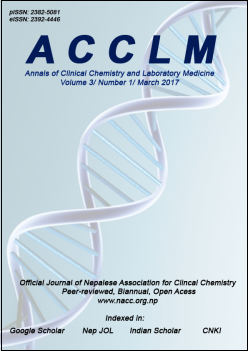Biomarkers of hepato-renal damage of fuel filling station attendants using or abstaining from use of protective gears
DOI:
https://doi.org/10.3126/acclm.v3i1.17176Keywords:
kidney, liver, petroleum product exposureAbstract
Different gears (e.g. overall, mask, gloves) are being used for protective purposes by fuel filling station attendants (FFSA) in Nigeria. Whether they can adequately protect susceptible organs like liver and kidney remains largely undetermined. The aim of the study is to compare the biochemical parameters of hepato-renal axis in FFSA that abstained from and that used protective gears in the course of daily duty.
Materials and Methods: The study population was grouped into three; GROUP A was made up of ten adult male FFSA who have used the protective measures consistently in the course of dispensing petroleum products. GROUP B was composed of 40 FFSA who did not use protective gears. GROUP C was the control group made up of thirty male adults not exposed to petroleum products. The minimum period of exposure for FFSA recruited for the study was 5 years. Information on worker safety was obtained through administered questionnaire concerning the use of self-protective equipment as a routine safety protocol for personal protection. Serum was utilized to assess biochemical indices of hepato-renal functions. Statistical differences were determined using Student’s t test and analysis of variance. p< 0.05 was considered significant.
Results: Both GROUP A and GROUP B showed activities or levels of ALP, AST, ALT, creatinine, urea, albumin, and total protein that were significantly different compared with control (GROUP C), suggestive of hepatic damage.
Conclusion: Data obtained from this study suggest that the three available protective gears used by FFSA in GROUP B did not significantly reduce exposure.
Downloads
Downloads
Published
How to Cite
Issue
Section
License
Authors who publish with this journal agree to the following terms:
- The author transfers copyright to the Nepalese Association for Clinical Chemistry.
- The journal publishes the work under a Creative Commons Attribution License that allows others to share the work with an acknowledgement of the work's authorship and initial publication in this journal and under the same share-alike license used here.
- Authors are able to enter into separate, additional contractual arrangements for the non-exclusive distribution of the journal's published version of the work (e.g., post it to an institutional repository or publish it in a book), with an acknowledgement of its initial publication in this journal.
- Authors are permitted and encouraged to post their work online (e.g., in institutional repositories or on their website) prior to and during the submission process, as it can lead to productive exchanges, as well as earlier and greater citation of published work (See The Effect of Open Access).




